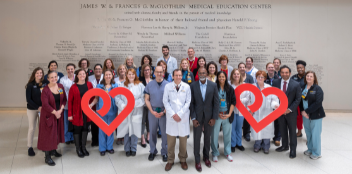Leading the Way in Research
Dr. Keyur Shah is the principal investigator for two exciting studies, ATTR-ACT and Endeavor. “We are the only center in Virginia engaged in these trials,” says Dr. Shah, medical director of VCU’s Mechanical Circulatory Support Program. The stage III clinical trials involve the use of the drugs tafamidis and AALN-TTRSC for the treatment of hereditary cardiac amyloidosis.
Cardiac amyloidosis is caused by deposits of an abnormal protein in the heart tissue. Over time, the accumulation of these proteins can lead to heart failure. Dr. Shah’s studies will be targeted to identifying and treating those with a mutation of the transthyretin [TTR] gene, linked to the condition.
“It’s hereditary, and we think it’s one of the major causes for racial discrepancies in heart failure outcomes,” says Dr. Shah, noting that African-Americans are disproportionately affected by amyloid-related heart failure in the U.S. With the Endeavor and ATTR-ACT trials now beginning, “We can offer medical therapy for a disease that previously required heart and liver transplantation.”
He is also heading a third trial, Discovery, which will involve identifying those who may have the condition as a result of a TTR mutation. The study will provide free genetic testing to patients.
Dr. Zachary Gertz is VCU’s principal investigator for a national study on the Parachute Ventricular Partitioning Device, which may help in the treatment of heart failure. As the name implies, the device opens like a parachute and “excludes the non-functioning part of the heart, concentrating the blood in the areas of the heart where the muscle is still squeezing well,” says Dr. Gertz, director of the VCU Structural Heart Disease program.
The device is being tested on heart attack survivors who are suffering from heart failure. Placing the device does not require open heart surgery—it’s done under conscious sedation in the catheterization lab. To date, Dr. Gertz, one of the top implanters in the country, has inserted five of the devices in patients. “They appear to be working pretty well, but that is just my anecdotal experience. We will not really know if the device works until the trial is complete.” He hopes that the parachute will improve the overall function of the heart for those suffering from heart failure. Patients will be followed in the trial for up to five years.
Dr. Antonio Abbate and Dr. George Vetrovec are leading a stage III clinical trial at VCU on the Odyssey, an injectable drug created by Sanofi U.S. Services Inc. and Regeneron Pharmaceuticals. The drug is aimed at patients with high cholesterol that cannot be sufficiently controlled by a lipid-modifying or “statins” therapy.
“This is a new agent that has incredible power for lowering LDL cholesterol—the bad cholesterol. It has significant benefits, particularly for people who can’t take the stats, which are considered the gold standard for lowering cholesterol,” says Dr. Vetrovec, director of VCU Adult Cardiac Catheterization Laboratory. “Time will tell whether Odyssey will have better outcomes than the standard therapy. So far, it’s been very powerful and very effective.”
Back to Spring-2015
Join our Pauley Consortium composed of patients, friends and advocates.

